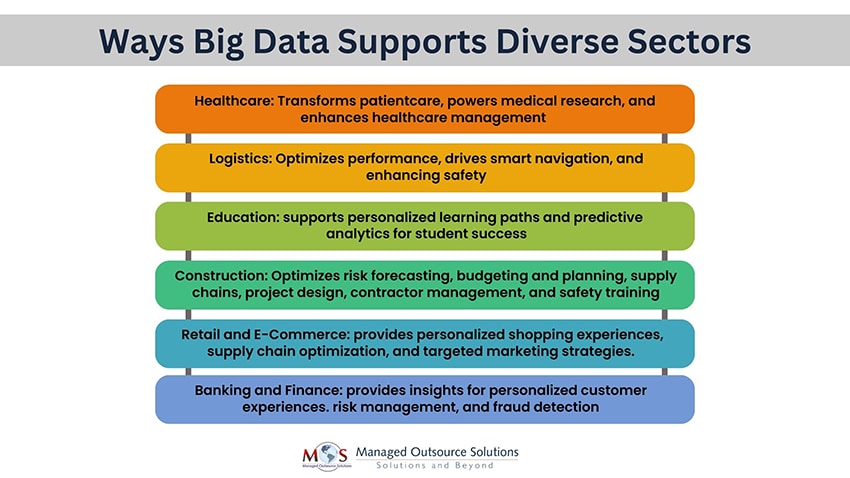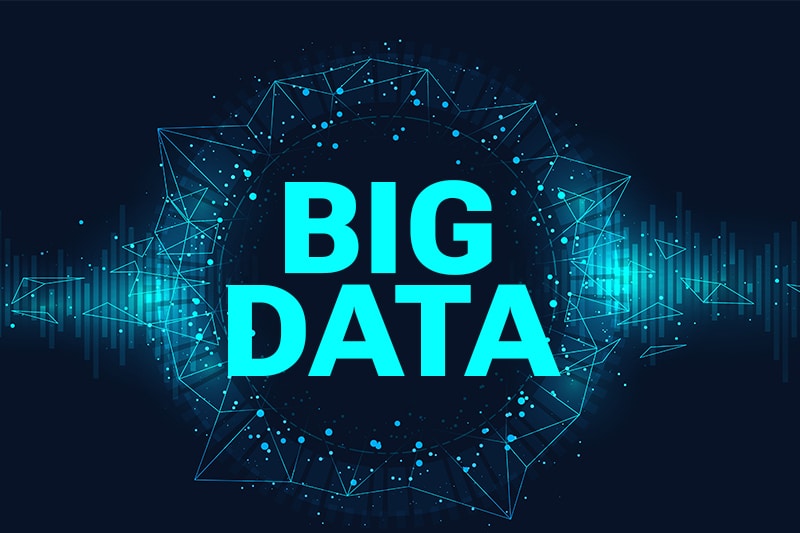In our data-driven world, big data has become an omnipresent and transformative force that is impacting virtually every industry. Regardless of the industry in which you operate, using the right strategies to leverage big data can help you extract value from the large volumes data you collect. For instance, business process outsourcing services such as data cleansing and data conversion play key role in high quality data that can be effectively analyzed and leveraged for valuable insights and decision-making. Artificial intelligence (AI) has eased data analytics by simplifying the processing of structured and unstructured data.
Join the Big Data Revolution

In this blog, we explore how different industry sectors can leverage big data to increase revenue and drive growth.
Six Industry Sectors that Benefit from Big Data
Healthcare
Whether your aim is to enhance healthcare services, product development or team skills in healthcare research, AI and big data are instrumental in shaping your strategy.
Healthcare big data involves gathering, analyzing, and utilizing extensive consumer, patient, physical, and clinical data to obtain meaningful insights. Document conversion services convert paper medical records into electronic files making it easier to access and manage data, increasing data accessibility and interoperability. When different types of data are in electronic format, advanced AI algorithms analyze the massive amounts of data in electronic medical records, lab results, vital sign recordings, and medication logs to find patterns, and help detect diseases early, leading to more accurate diagnoses and better patient outcomes.
China is a prime example of a nation that employed advanced technologies in responding to the sudden public health crisis posed by the coronavirus. Big data and AI applications were widely utilized in COVID-19 prevention, diagnosis, and treatment management decisions.
Logistics
Big data platforms incorporate predictive analysis and machine learning (ML) to automate fleet management. They enable fleet managers to make informed decisions on daily operations, including driver performance, vehicle condition, asset and driver locations, route information, fuel use, and preventative maintenance. Predictive analysis contributes to increased cost savings, enhanced safety, risk mitigation, and, crucially, a safer experience for drivers during road trips.
Big data impacts everything from holiday planning to doorstep package delivery. Logistics companies employ big data to optimize operations utilizing data to understand driver behavior patterns, optimize routes, schedule repairs, reduce downtime, and support compliance with regulations.
A CareerFoundry blog discusses how United Parcel Service (UPS) employs big data for monitoring warehouse stock levels, analyzing traffic reports and product orders, and much more. Their insightful data analysis revealed left turns across traffic caused inefficiency. By implementing a ‘no left turn’ policy, UPS achieved fuel savings of up to 10 million gallons less gas per year plus a remarkable reduction of 20,000 tons in carbon dioxide emissions.
Watch the video on how data analytics serves as an inevitable aspect for the logistics industry.
Education
How does the educational sector benefit from big data? Educational institutions handle and manage vast amounts of student data generated yearly. Until recently, the approach to education was more or less one-size-fits-all. This is no longer the case. Big data enable academic institutions to incorporate critical systems, applications, and platforms to create efficiencies, improve the educational experience and reduce costs.
Here are some ways big data benefits the educational sector:
- Facilitates decision-making by processing and analyzing information.
- Allows faculty to create better learning environments and to more effectively evaluate their lessons and courses
- Offers personalized learning solutions and enhances student performance
- Captures students’ attention through biometric data analysis during lectures
- Reduces dropout rates through predictive analysis of student participation
- Enables career prediction by analyzing students’ learning performance data
Georgia State University adopted big data to improve student results. To tackle the issue of students accumulating credits without progressing towards graduation, the administration introduced a system that monitors students’ decision-making and forecasts their academic outcomes. This reduced the average time for students to graduate by half (www.linkedin.com). Pretty impressive stuff!
Construction
Construction companies can utilize big data for a variety of functions. If applied correctly, the technology can optimize almost every phase of a construction company’s business, including risk forecasting, budgeting and planning, supply chain optimization, project design, contractor management, predictive modeling, and safety training. Additionally, it can help the industry improve marketing, machine maintenance, scheduling, and return on construction assets.
Big data drives significant cost reduction in this sector. Material waste and error correction contribute to approximately 35% of construction costs. Transparency Market Research predicts global construction waste to reach 2.2 billion tons by 2025. Big data not only cuts costs but also boosts profits by mitigating errors. Utilizing digital tools from the planning phase, along with lean construction, minimizes waste by providing suppliers with ample notice for on-time material and equipment delivery. Big data aligns plans and diagrams with site studies, preempting issues. This aids project managers in informed decision-making, preventing potential problems throughout the project timeline.
Retail and E-Commerce
One of the most apparent applications of big data applications is retail marketing and advertising. Big data offers an extensive reservoir of information, allowing ecommerce companies to gain valuable insights into their target demographic, consumer behavior and preferences, competitors, and market trends. Leveraging big data analytics in advertising unveils hidden patterns and connections, enabling companies to:
- Make informed decisions
- Implement customer-centric marketing strategies
- Enhance competitiveness, sales, and future growth
Amazon collects a lot of data on its users. The ecommerce giant tracks what users buy, how often and for how long they stay online, their browsing habits, and product reviews. This information enable them to created targeted marketing strategies. Those ads you see on Facebook or Instagram are also prime examples of big data in action. Another example is the use of customer data by Netflix. Big Brother is watching you! Do you know that Netflix not only tracks what you watch but also when you watch it, the device you use, if a show is paused, and how quickly you finish watching a series? Netflix also takes screenshots of what you watch twice to create a custom user profile and make movie recommendations.
Banking and Finance
Banks are leveraging cloud-based solutions to store and analyze data, improving scalability and cutting costs. They employ AI and data analytics to understand customer behavior and market trends, enhancing experiences, optimizing operations, and ensuring security and compliance. Big data enables the creation of digital products like mobile apps and online platforms, improving customer service. Chatbots and NLP automate tasks, and advanced data processing enhances financial reporting accuracy. Overall, big data empowers banks to stay competitive by processing and acting on real-time market data efficiently.
Myriad industries benefit from big data. The support of data cleansing, conversion and processing services are pivotal to prepare your data for seamless integration with analytical tools. Your journey towards data-driven excellence begins with strategic partnerships. Teaming up with a proficient business processing outsourcing company is a practical strategy to maximize the impact of you big data and transform the way you leverage information for unparalleled success.
Harness the power of big data with quality data processing solutions.
Contact us Today to Discuss Your Specific Needs.




